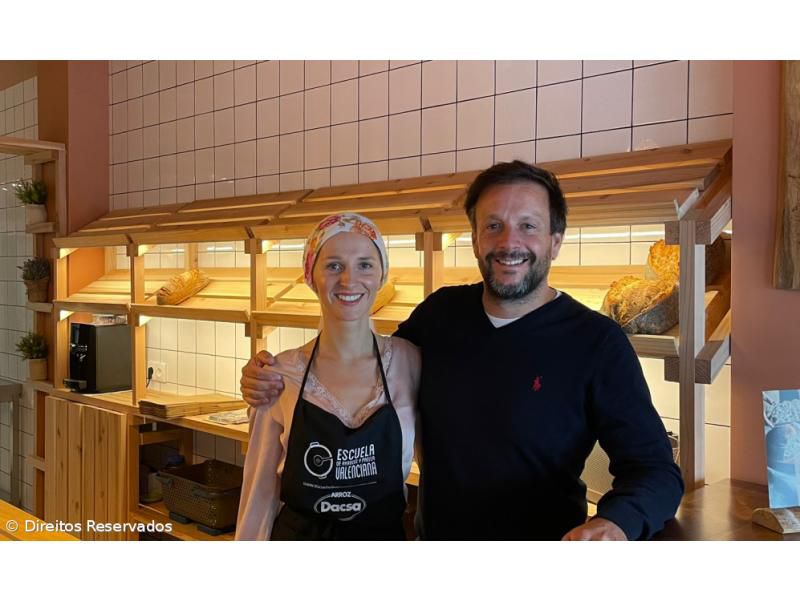Daily bread in the Azores has changed a huge amount since Senhor Viveiros began milling his corn in Capelas nearly seventy years ago. A couple who know quite something about this history are Lithuanian born Julia Caplygina and São Miguel local Nuno Alves. They are the owners and founders of Ponta Delgada’s first artisanal bakery, Massa Mãe and can explain to you the highs and lows of the Azorean affair with wheat bread if you happen to pass by their delicious smelling shop. Massa Mãe means, in English, mother’s dough, and refers to the old-fashioned way of baking with natural yeast at home, instead of commercial chemical yeast. Julia is absolutely passionate about this kind of bread and its health benefits – easily digested, better for our microbiome and, in my mind at least, just much tastier. I’m not the only one. Massa Mãe bakery opens its doors at 11am and there is always a queue outside. Be quick if you want a loaf – they generally sell out within the hour.
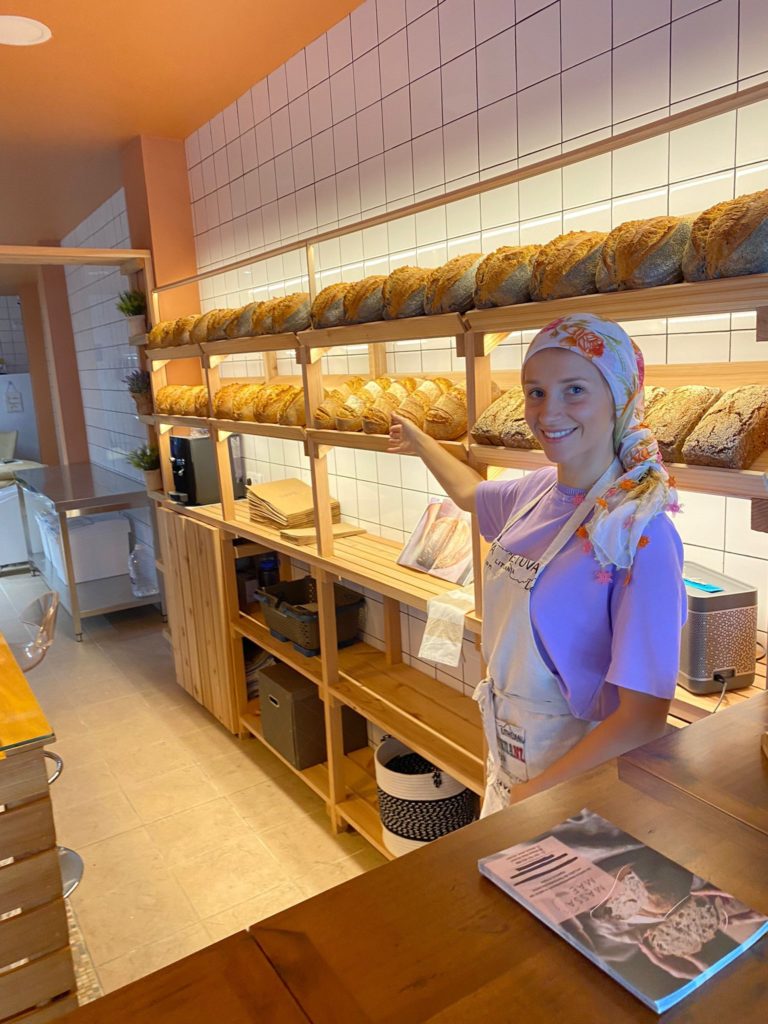
Interviewer: Tell me how you first came to settle in the Azores?
Julia: I first came to the Azores in 2017 with my friend for two months. We just spent some time getting to know the island, the people and in general how the life is here. We liked it very much and met a lot of nice people. I remember what really stayed in my mind was they were so helpful. They didn’t know me, they didn’t know where I was from but they would do everything to help me and that really surprised me. Then in the next year I was in Spain. In Spain, I met Nuno who was from the Azores although we had not met here. It was a very nice coincidence that I had already been on this island that not a lot of people know.
Nuno: She said, that’s it. He’s the one.
Julia: I was living in Ibiza at the time and I was flying to see him. Then, when I got pregnant, we decided that the Azores would be the place where we would bring up our son. Nuno had been working abroad as a captain for twenty years and he also decided that this was the time to come home.
Interviewer: So, Nuno, you were happy about Julia’s decision to bring your son up here?
Nuno: I was working on boats since I was nineteen, my first trip around the world and I always had the idea of coming back to the island where I grew up and I remember thinking this was the time. I remember that I was about to sail to the Antarctic and the weather got really really bad so we couldn’t leave and that same day I got a phonecall from Julia and she was crying because she was pregnant. I was super happy and super excited with the idea of becoming a father which was always a dream. So I jumped on the plane that same day, I flew to where she was in Spain and we managed to make a plan and my first question was where do you want to raise this baby that is coming and she said the Azores, of course. I was like, yes! So, yes we made that step together and I am very happy to be back to the place that I grew up. The more I travelled the more I was sure that this was the place I would like to come back to.
Interviewer: What made you think that this was the right place to bring up your son?
Julia: It’s really an extraordinary place. I loved the idea of raising a child by the ocean, not in a big city where everyone is rushing around but with people who care how they live their lives, how they eat, the way they spend their days. I was not sure how it would be in the long term but at least for the beginning for Oliver’s life I really thought that was a nice place to begin life as a family.
Interviewer: You both represent the old and the new sides of the island. What were the difficulties and the surprises of returning here?
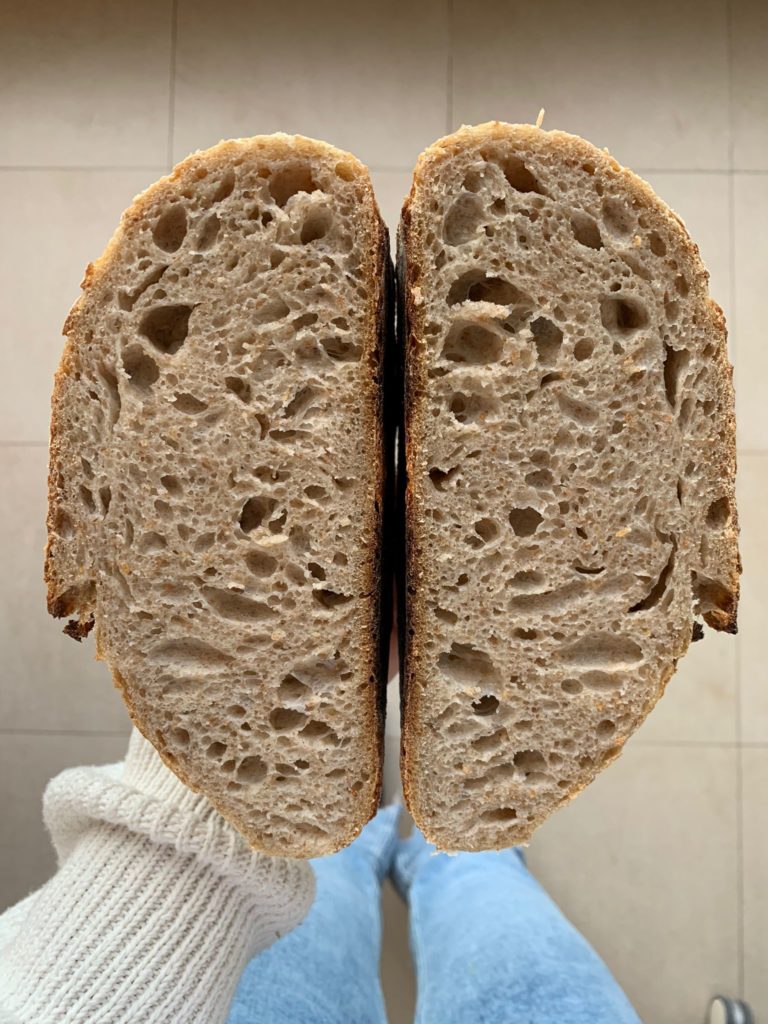
Nuno: With me, I like to see the good in every situation, I guess it is the amount of time I spent at sea. To be honest with you I cannot see any bad side in being here. Julia sometimes looks at me and says you are never unhappy! I have my moments, but I see a lot more of good things than bad things and the good things are so significant that I just don’t see any downside.
Interviewer: What do you think about foreigners from different places coming to live here. Do you think they have changed the character of the islands since you first left?
Nuno: Luckily it isn’t the type of destination where people come to party or where people come to sunbathe all day long, nothing against sun bathing of course, but I think just the fact that someone comes to the Azores on holiday or even to live means that it is someone close to nature or who appreciates nature and who is sensible enough to want to keep it the way it is. I don’t want to be selfish and think that this is my island and no-one should come. No. In fact I always envy people who come here for the first time. We all deserve to see this place and if people would like to live here, why not! But to answer your question, I see good changes, new ways of doing things that we like to see and if they don’t show it to us we would never know.
Julia: I would like to add a few things. The benefits of this island. My viewpoint the biggest benefit is the strong sense of community. As I said, when I came here with my friend in 2017 everyone was supporting and helping each other. There is a community of people who live here are so welcoming. Oliver goes to school now and all of Nuno’s friends children also go there and on the street I often hear, oh, it’s the son of Nuno, without them even knowing me and it feels good. For me its a new place but it doesn’t feel like a new place. And it feels very secure. A downside, but I like to see it as a good thing, people often complain that oh here we don’t have a lot of things, there’s not much opportunity for business, a lot of things are lacking, why is no-one creating it. The way I see it, it’s a small island not a big city like Lisbon. When you go to a big city you have those things and here you go back in time a bit. It’s nice because it feels more natural and you are not exposed to things that perhaps you don’t actually need. I like that kind of environment. I have pleasure going away from the island and just seeing the enormous tall buildings but it’s also nice not to have them here.
Interviewer: I think it is very precious just to be in a place where technology and rapid advancement of society is slowed down a bit. I think that is very precious. I also think the weather helps us a bit, we have beautiful days but it is so unstable that it is a tricky holiday destination. An advantage for us but not perhaps for holiday makers. Let’s get onto the bakery! You have just opened an artisanal bakery in the centre of Ponta Delgada, please tell me about it.
Julia: It was never planned! It was never in my head before. Actually whatever was related with customer service directly I was running away from it! However, once I realised the benefits of this bread and what it does for our health I liked the idea of the bakery and I thought it could improve or change lots of people’s life. Especially since we don’t have very good bread on the Azores unfortunately, but it seems like more and more people are making it at home and maybe there is a few other people who want to come into this market so I’m happy. My idea is to create a really good quality product that people can trust and eat it without any guilt. Often people say I love bread but I don’t want to eat it because I don’t want to get fat, which is true about certain breads but not these breads which have a lot of benefits for our health and intestines particularly. This is what I wanted people to know about it, so they can eat without guilt, knowing they are feeding their body something good. Grains are not something we should be avoiding but quite the opposite. It is just the way the flour is created which makes the difference and our flour is prepared in the old way, stone milled, which makes a difference. Also we don’t use the dry yeast, we use the naturally fermented yeast which has a lot of benefits for our health.
Interviewer: What’s been the reaction of local people to this very old-fashioned style of bread and bakery?
Julia: We’ve just been open two weeks. I think people are aware of this kind of bread and as I said some people are making it at home because their mothers taught them to do it and as you said it is a fashion and people recognise this style of bread because they travel and they see good bakeries in England, in Portugal on the mainland, in other places in Europe but when they come back home they don’t have it. So, I think that the reaction was really good. Finally someone did it on the island!
Interviewer: Could you talk to me about the name of your bakery which I thought was really nice, massa mãe.
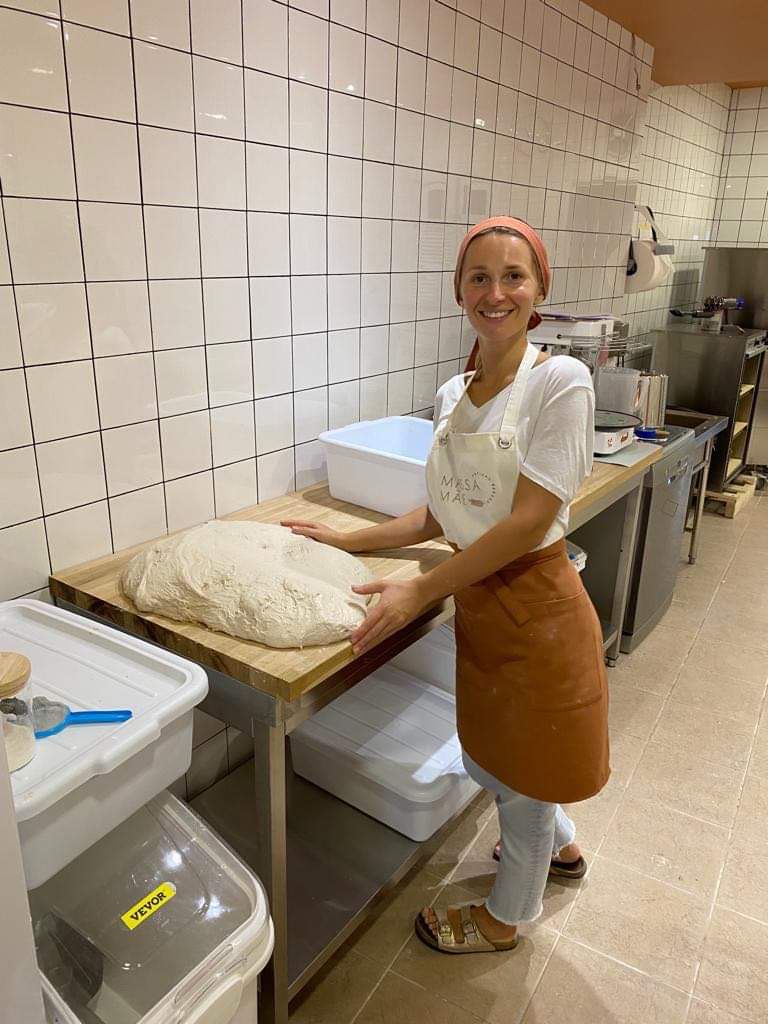
Julia: Yes, massa mãe is the name of the bakery and it means mother’s dough and actually natural yeast, the yeast that used to made at home. I liked this name, massa is the dough, mãe is like the mother and I am the mother. It’s also very straightforward, if you say massa mãe in Portuguese already everyone knows what you are talking about, a dough, a bread made very naturally. We were looking at different options but finally we settled on this.
Interviewer: Yes I think it is a great name, many Portuguese people talk about massa mãe with so much affection, they love it! I remember you telling me a bit about the history of bread in the Azores please could you tell me a bit about that now?
Nuno: The more Julia was baking the more we were researching about the past and about how we can get better flour and slowly slowly get to perfection, which was the idea at the very beginning which was to bring something to our community and to try and reach perfection. The more we were digging into the history the more interesting it was getting. So apparently, we had a lot of wheat in the past in the Azores, Terceira, Faial, but in particular in São Miguel where we are now. All the area from Ribeira Grande, Maia, Nordeste, was full of wheat fields and we would export to the mainland, even to North Africa. Apparently in 1906 there was a man from Madeira island that bought a huge industrial machine which had three floors. This machine had the capacity to mill 30 tonnes per day which was something insane at that time. But for him it wasn’t worth it to buy a little quantity from Maia, a little quantity from Nordeste and so he began to import large quantities of wheat. There’s a lot of labour involved to grow wheat and at some stage locals didn’t have anyone to buy their local grains. They started giving that same grain to animals but there was no profit so slowly slowly this man ruined the past of wheat growing. Today there is no more wheat and only a little bit of corn. This is very unfortunate considering that we used to export even, as I said, to North Africa. It was a big economy at that time and it is now all gone since this man decided to be smarter than the others.
Interviewer: The wheat we get now in the Azores is all imported. I get told many stories that there used to be lots of different food industries in the Azores and that those have almost all died off in favour of diary farming. Slowly, slowly there is a few different projects coming up. Have you got any plans to grow your own wheat?
Nuno: This would be our plan to have bread which is 100 percent from the Azores but you know things take time. We do have amazing news way earlier than we thought. We found a beautiful family from Agua Retorta on the East part of the island and they have managed to restore an old corn grain and so luckily this grain has been certified not-GMO.
Julia: And it is an original Azorean grain meaning it has not been taken from abroad.
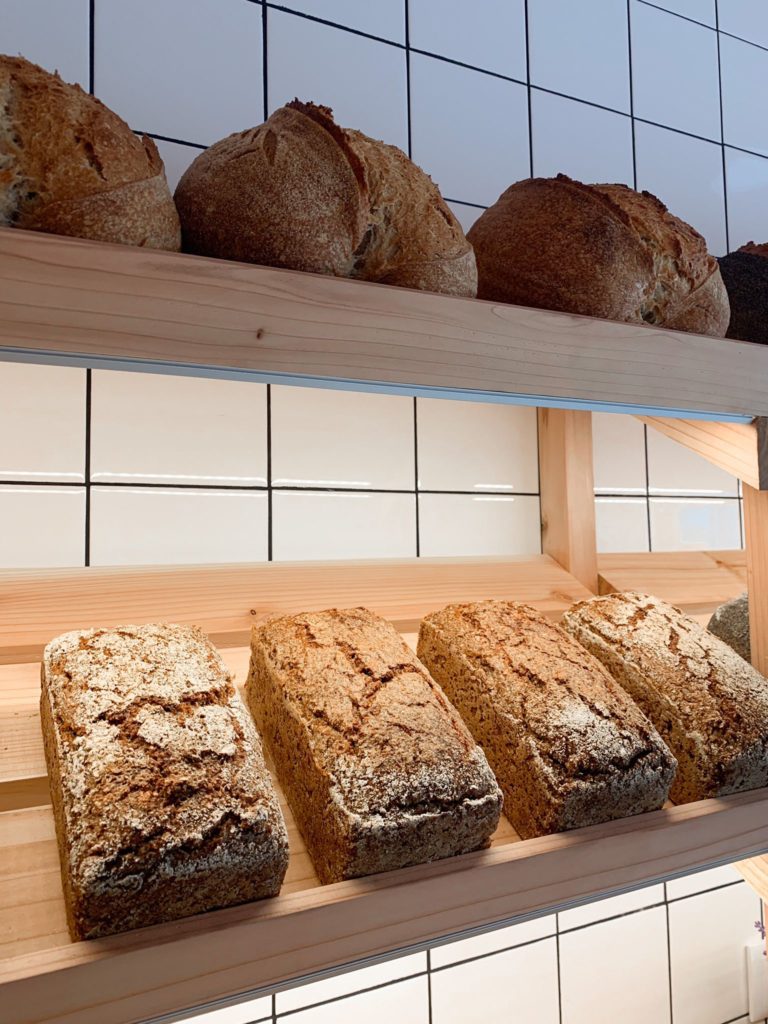
Nuno: Yes, so for now we would be more than happy to work with this family which shares our philosophy. So we will have a corn bread made from yellow corn but hopefully in the future they will do some experiments with wheat. But that is our dream to have 100 percent Azorean bread. We don’t want to do it alone we would like to have people to help us with this who share the same philosophy.
Interviewer: Any other thoughts?
Nuno: We hope that Julia’s bakery will inspire other people to not be afraid to try something new and inspire other projects which will help the community, it doesn’t specifically have to be bread. There are plenty of things that we are missing on this island and we really hope that other people will start new projects on the islands.
Interviewer: New and beautiful projects. Anything else Julia?
Julia: Just something personal about working in a bakery. It is a nice way to expose my creativity. With baking there is so many endless possibilities, the way you mix the dough, the way you shape it, the way you bake it. I can be creative which I really like. What I love is that you always have a little bit of stress inside of you to see how will it come out and it always comes out different, sometimes very beautiful, sometimes flatter, but it is always the same quality and you know that you will be putting a nice thing into your body. Just the idea of people putting that bread on the table and sharing it with others and hearing that they loved it and it made them feel good and maybe it was their mother who made this kind of bread, this is what keeps both of us happy and going forward with this project.
